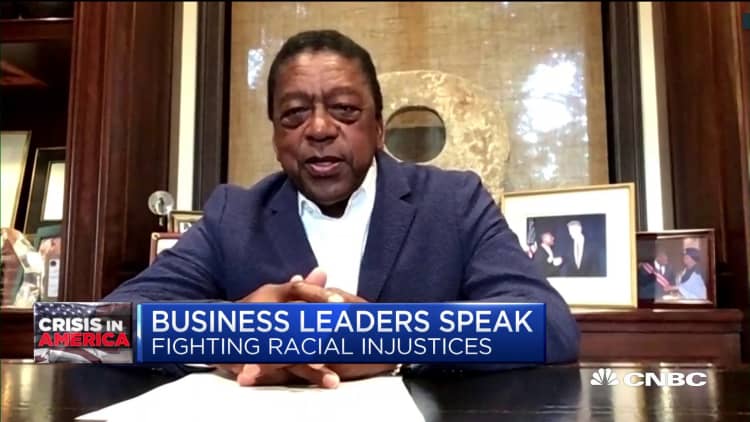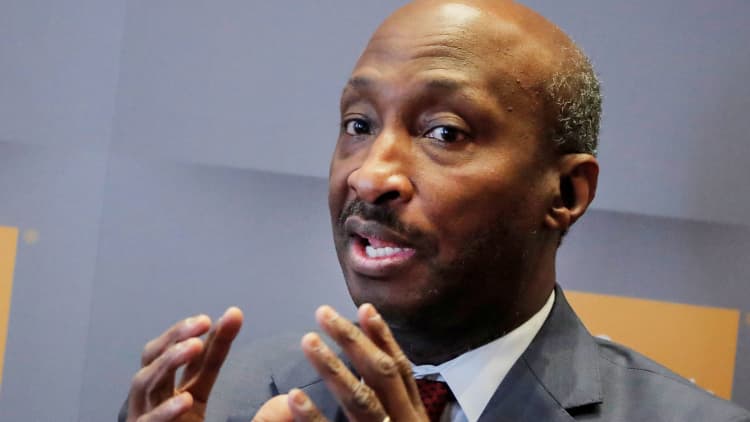Nationwide protests in response to the killing of George Floyd, an unarmed 46-year-old black man who died while a Minnesota police officer kneeled on his neck for nearly nine minutes, have sparked conversations about race, justice, policing and politics in the workplace and at home.
For black Americans, conversations about racial inequality don't happen only when there's prominent news coverage of such events.
Kwame Christian has felt the weight of confronting racial inequality to the point of burnout. The mediator, author and speaker spent several years working as a legal analyst at the Kirwan Institute for the Study of Race and Ethnicity, where he focused on issues such as health equity, criminal justice and civil rights.
"Doing that equity work and having these difficult conversations about race burned me out emotionally," he says. When he left the job in 2016 to start his own law firm, he decided to do a one-year detox from the news media and at one point even unfollowed his wife on social media to limit his engagement with contentious news.
These past few weeks, with increasing coverage of Floyd's death and the fatal shootings of unarmed black people, from 25-year-old Ahmaud Arbery out for a jog in Georgia, to 26-year-old Breonna Taylor killed in her Kentucky home by police, Christian felt that unplugging from the conversation wasn't an option this time.
"It hit me that people around the world look to me for leadership on how to have difficult conversations, and my silence was hurting the cause," he says.
Now, as director of the American Negotiation Institute, one way he's starting to speak up is by hosting a public Q and A session where he'll talk about how to have difficult conversations about race, equity and justice.
"My motto is: The best things in life are on the other side of a difficult conversation," Christian says. "If we can have the conversation in a better way, we can make meaningful change in the world around us."
Discussing racial inequality can be difficult, but the conversations are critical and happening nonetheless. CNBC Make It spoke with leaders to get guidance on how to be an ally and engage in thoughtful dialogue with coworkers about civil unrest in the U.S.
Why it can feel hard to talk about racial inequality, and why you should do it anyway
News of violence and discrimination is inherently traumatic, particularly for members of the black community who experience it at disproportionately higher rates. When people of various races, backgrounds and experiences enter the conversation, layers of difference can add even more tension to the dialogue.
"The reason why these conversations are so difficult is because they are deeply emotional," Christian says. "Deep inside everybody, there's an internal scale of justice. Everybody has a deep belief of what's right and wrong. When that's out of balance, it hurts us deeply."
He says that fear of saying the wrong thing often keeps people from wanting to engage in a discussion about race and inequality in the first place. That's often because while the payoff of such conversations can be unclear (dismantling systemic racism), the risk (rejection of your own beliefs) is much clearer.
"When you're having these conversations, it might seem like we're talking about specific issues, but what we're really talking about is who we are and our perspective on what the world should be," Christian says. "Then we're comparing what the world should be and what it is.
"It's all incredibly nuanced and messy, and people don't realize the proxy wars happening beneath the surface of these conversations."

With that said, thoughtful dialogue can acknowledge difference of perspectives while inviting empathy, questions that lead to conversation and a resolve to jointly solve a problem. That might not be solving systemic racism, Christian points out, but perhaps starting with validating that people's concerns are heard and understood.
If these conversations aren't already happening in your workplace, it may be beneficial to start them, says Cheikh Mboup, president and chief operating officer of Edible Arrangements. This week, he and his leadership team announced several initiatives for employees to engage in conversation specifically to address current events that are highlighting racial inequality and trauma in America, including an employee town hall, one-on-one sessions and a therapy hotline available to all staff.
"You spend so much energy working together, you can't not talk about it," Mboup says of openly inviting these discussions to take place. "If I'm feeling it, I'm sure others are feeling the same thing, so why not talk about it? The fear of what could go wrong is too minuscule in comparison to the fear of what may happen if people hold it within themselves."
How to engage as an ally
In order for a white person or non-black person of color to be an ally and thoughtfully engage in discussions about race, it's crucial they do their own work to understand the privilege that shapes their world view, and educate themselves on the things they need to personally learn and unlearn in order to be a better advocate.
"People are confused about how to be helpful, make an impact and be a supporter," says Melody Li, an Austin-based therapist and founder of the Inclusive Therapists community. "When it comes to intentional work, I would recommend the person who wants to engage check they've done their own work first."
Li gives a number of examples of what that work can look like in this moment, including reading books to examine the role of systemic racism in the U.S., supporting black community members through their businesses, donating to organizations that work to dismantle racist policies, talking about your own racism with family members or in therapy, protesting if that feels right and many other ways to show up.
Be prepared to understand how your own experience, because of your race and background, will shape what you bring to and take from the conversation. Li says individuals have their own responses to racial trauma, which can range from not knowing what to do to exhibiting defensiveness and entitlement.
"If people choose to have a dialogue," Li says, "people need to understand, do I know my racial trauma responses? Do I know about my lineage's relationship with power and oppression? Am I in a place where I've healed enough to tolerate the shame and embarrassment of my experience to bridge the gap and have deeper and more meaningful conversations? Slow down and be reflective of yourself before engaging in these conversations."
Checking in with a black coworker is one step to being a better ally, and it may open a discussion about racial inequality. However, recognize the other person may not be able to engage in a discussion with you right now.
Li says that allyship can help in this scenario, too. "If you're a black person, and it's falling on you to educate others, give yourself permission to step away from the conversation. Or call in a white ally."
Speaking to white and non-black allies, Li says, "if we all tend to our people, then we alleviate others, especially marginalized groups, from having to carry that burden."
Steps for starting a difficult conversation about race
From a mediation perspective, Christian says a good place to start a difficult conversation is to acknowledge its difficulty and validate the other person's feelings, whether it's shock, sadness, anger, confusion or shared discomfort. Second, get curious and ask open questions to better understand the other person's viewpoints. Doing so with a compassionate tone can help the other party speak without fear of judgment, and by showing that respect, they will hopefully do the same for you.
Phrasing responses as "it seems as though you feel this way," "out of curiosity, why do you feel that way" or "that's an interesting point, but I have a few questions about that" can help break down the emotional barriers to discussing uncomfortable topics, so the other person doesn't feel defensive in explaining themselves.
Finally, as you continue, view your conversation as moving the needle and getting closer to solving a joint problem.
"The fundamentals of collaboration and negotiation work are to improve the situation," Christian explains. "The goal of these negotiations isn't to solve racism. We have to figure out a realistic goal of this conversation. If it's just for you to be heard, great, that we can accomplish. If we want to talk about what we can do in workplace to have important dialogues about this, we have to strategize a solution."

In times of disagreement, Christian recommends people be mindful of their use of language and what could be interpreted as insensitive to others during an emotionally stressful experience.
He adds that, in some instances, it can be freeing to assume people, especially your colleagues who know you and have a personal relationship with you, aren't being intentionally hurtful.
"When I give someone the benefit of the doubt, I'm able to perform in the conversation at a much higher level than when I think the person is acting against me with bad intent," he says.
The role of leaders in intentional dialogue
In late 2019, Johnny Taylor, president and CEO of the Society for Human Resource Management, predicted politics would be the biggest source of workplace debate in 2020.
"I didn't think it could get any hotter and more divisive than politics in the presidential election year," Taylor tells CNBC Make It this week. "But I was wrong."
While contentious discussions happen in the workplace, whether they're related to politics or race, Taylor says it's on companies to "create inclusive cultures of civility where difference isn't a disruption."
As for today's civil unrest, he says leaders should assess if they're equipped to manage the conversation, and whether their plan of action will be communicated with their employees, with their customers or with both. He makes it clear that leaders should at minimum make resources available for employees to contend with the impact of the news, such as grief counselors, access to therapy, diversity and inclusion resource groups and employee assistance programs.
"Making them available as a resource is different than assigning or requiring black employees to sit down and have the conversation. That's way over the top," Taylor says.
Not all employees may be ready or willing to talk in the workplace about how they're feeling, but if they are, management and HR must be ready to respond in kind, Taylor adds. "If employees collectively say, We want to talk about X, there's a way to do that from the perspective of diversity and inclusion, as well as with empathy. There are also experts in having these conversations, and you had better be guided by one.
"It's critical to set it up to say, if we say we value diverse perspectives, provided they're done respectfully, we have to allow for that," Taylor continues. "Inclusion is also related; when someone voices an opinion, even if it's a minority opinion, they cannot be cast out from the company culture.
"Be respectful, and use that empathy muscle."
Don't miss:



